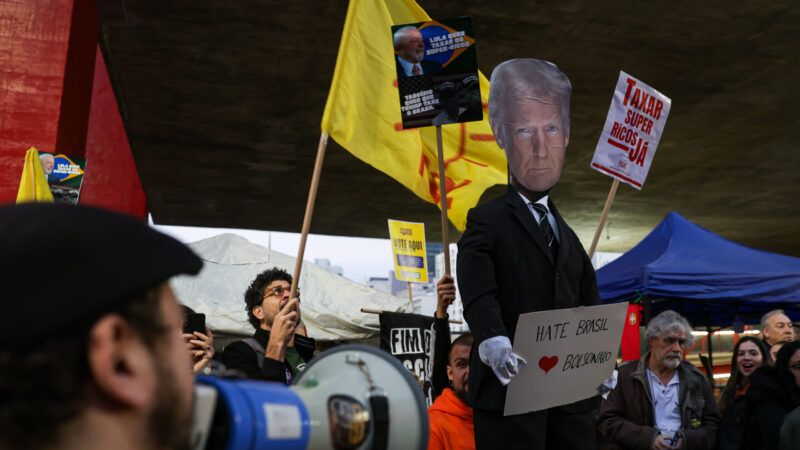Brazil's Rogue Court Is Receiving Global Blowback
Brazil’s judiciary has abandoned neutrality, with sweeping crackdowns on speech and political rivals. A U.S. tariff response signals the crisis has gone international.

Brazil's highest court is no longer acting like an independent arbiter of justice. In recent years, the Supreme Federal Court has transformed into an overtly political actor—censoring dissent, banning platforms, and prosecuting opposition figures, all while consolidating power beyond its constitutional role.
Although the 1988 Brazilian Constitution mandates a separation of powers, recent years have seen the judiciary, particularly the Supreme Federal Court, assert growing dominance over the political process. The court is comprised of 11 appointed justices who serve until the required retirement age of 75. Most were nominated by administrations aligned with the Workers' Party, the left-wing populist party led by current Brazilian President Luiz Inácio Lula da Silva, known as Lula.
The court's decisions have increasingly reflected its ideological leanings, especially in cases targeting dissent. Justice Alexandre de Moraes has become the face of this shift. In 2019, the court launched the so-called fake news inquiry, a secretive investigation targeting its critics—including journalists, opposition politicians, and ordinary citizens—on social media. Since then, Moraes has ordered press censorship, account suspensions, and even platform-wide bans. Ahead of Brazil's 2024 elections, he ordered the country's internet providers to block access to X, arguing that the platform could influence the election outcome.
Frustrated by Congress' refusal to pass legislation regulating social media, the court recently reinterpreted the 2014 Marco Civil da Internet (the "Civil Rights Framework for the Internet")—Brazil's foundational internet rights law. Under the new interpretation, platforms can be "held civilly liable for damages caused by content published by third parties." In other words, if a platform fails to delete user content quickly enough, it could be punished. What Moraes had been doing unilaterally now has institutional backing.
One of the inquiry's targets, journalist Allan dos Santos, moved to the U.S. after having his accounts blocked, his preventive detention ordered, and his extradition requested by the court. Moraes later demanded that the platform Rumble block his account, along with those of other Brazilians with U.S. citizenship. Rumble refused, arguing that it has no headquarters in Brazil and that the users in question do not reside in the country. In response, Moraes ordered a nationwide ban on Rumble in Brazil. This was the third time an entire platform was taken offline, after X and Telegram.
During the 2022 elections, the judiciary played a decisive role in the race between Lula and former Brazilian President Jair Bolsonaro. The Superior Electoral Court dictated what could and could not be said about Lula, and news outlets were prohibited from reporting certain facts or expressing certain critical opinions. Articles about his ties to Nicaraguan dictator Daniel Ortega were taken down, and journalists were instructed to avoid using terms that recalled his past convictions. Far from acting as a neutral referee, the judiciary took an active role in defending one side of the contest.
On January 8, 2023, thousands of protesters went to Brasília to demonstrate against Lula's presidency, with some allegedly storming government buildings in the process. Over 1,400 people were arrested, including some who didn't participate in the protest or remained peaceful throughout. Many remain imprisoned without due process, and dozens have already been sentenced to up to 17 years in prison for an attempted coup. Among those sentenced are street vendors, homeless people, and a woman who wrote on a statue with lipstick. The most tragic case was the death of businessman Cleriston Pereira da Cunha, known as Clezão, in prison.
The real target of the Court's actions is Bolsonaro, the main opposition figure to Lula. He and dozens of allies, including former ministers and military officers, are being prosecuted for attempting a coup. Yet Bolsonaro was not even in Brazil on January 8. Before leaving office, he acknowledged the transition by appointing the military commanders suggested by Lula's team. Nevertheless, the Supreme Federal Court continues to push the events as an organized conspiracy.
These judicial abuses are no longer going unnoticed abroad. On July 9, President Donald Trump announced 50 percent tariffs on all Brazilian exports to the United States—not as another protectionist play in his trade war, but as a form of political punishment. In a letter posted to Truth Social, Trump claimed the treatment of Bolsonaro is an "international disgrace" and "a Witch Hunt that should end IMMEDIATELY."
Trump's announcement followed weeks of messages supporting Bolsonaro and denouncing Brazil's Supreme Federal Court. U.S. Secretary of State Marco Rubio spoke of possible sanctions against Brazilian authorities involved in the repression of free speech. Soon after, the tariffs were imposed.
The response cuts both ways. American manufacturers who rely on Brazilian imports are now squeezed, while Brazilian exporters are losing access to their second-largest trading partner. But the deeper issue lies in what the tariffs expose: a judiciary behaving as if it's above constitutional restraint. That illusion holds only until its overreach begins to affect foreign interests.
Brazil's institutions are unraveling. When a trade partner responds not to perceived market imbalances but to judicial censorship, persecution of political opponents, and control of public debate, the problem is no longer domestic—it's international. Freedom of expression is the bedrock of democracy. Open trade needs to be restored, but just as importantly, Brazil's democratic institutions need to be restored, too.


Show Comments (21)